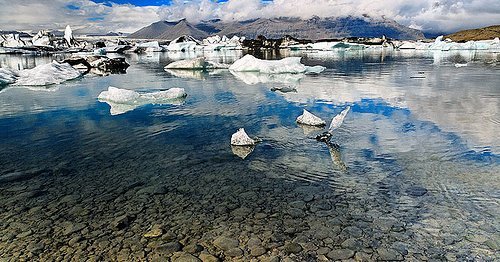On 16 July 2009 Iceland formally submitted an application request for membership of the EU to the Presidency in Stockholm that narrowly passed [1] the Icelandic Parliament. At the Council meeting of 27 July EU Foreign Affairs Ministers acknowledged Iceland’s application and invited the Commission to submit an opinion on it. The Council recalled the principle that each applicant country is assessed on its own merits, which means that it has to comply to all conditions mentioned in the criteria of Copenhagen [2], included the implementation of the acquis. This remark is important to clarify that the EU doesn’t favour one candidate country over another, in order not to rebuff other candidate members. It’s the applying country that is responsible for its own progress in the negotiations, or at least, that’s how it is supposed to be.
The procedure for accession of Iceland is indeed on the fast track. The Swedish Presidency would even like to complete the procedure before the end of the year, so that negotiations can start as early as 2010. However, this isn’t really unexpected or ambiguous. Iceland has a long history with the European Union and will be able to fulfil without much difficulty the several criteria of Copenhagen. Other candidate countries in the Balkans and Turkey still have a lot of work before they will meet all the preconditions. Most of Iceland’s economic and commercial relations with the EU are already covered by the European Economic Area Agreement (EEA), which extends the Internal Market legislation, with the exception of Agriculture and Fisheries. Iceland is also an associate member of the Schengen Agreement since 2000.
Agriculture and Fisheries will be two of the several thorny issues to resolve before Iceland can join the EU. In particular Fisheries which has always been an important reason why Iceland didn’t apply previously. Another bottleneck can be the problem of reimbursement of Dutch and British savers that lost their money when Landsbanki, one of the three top Icelandic banks, failed last year [3]. ,quote>Before Iceland can join the European Union, the Lisbon Treaty must be ratified. A further enlargement is a challenge for the EU as well. Before Iceland can join the European Union, the Lisbon Treaty must be ratified. The EU can’t allow another round of discussions and further postponement on the ratification of the Treaty because of the accession of a country that was rather sceptical of the European Union before it was struck by a major economic crisis. Of course, Iceland must be able to acquire some opt-outs, just as some other member states did. As some foresee that the negotiations can be ready by 2011, the Lisbon treaty should by then already be implemented. The Irish people can vote for a second time on the Lisbon Treaty on 2 October 2009 [4].
The negotiation talks can also take several years before they’re accomplished. Other estimates say the second half of 2011, beginning of 2012 [5]. The final decision will be put to the people in a referendum. Many things can happen during this period, and especially the motives for EU membership and adoption of the euro will have blurred. The economic collapse of 2009 will be history by then – hopefully. Of course, the results of a referendum are always difficult to predict.
What will be the prospects of another seemingly eurosceptical nation in the EU? Troubles will inevitably emerge, but then again, Iceland has a lot to offer as well. The country has valuable experience in sustainable fisheries, which is already an urgent matter. Another trump card is renewable energy. Iceland is a very fragile and delicate island. It has learned to be very careful with its natural resources. These will certainly be advantages for the European Union. Moreover, Iceland borders the Arctic, a region ever more interesting and important for the EU. Many fear that the accession could slow down the further integration process in an ever larger Union. However, in an interview Commissioner for Enlargement Olli Rehn stated that “the empirical evidence shows that the EU has been able to take even quiet difficult decisions after the latest enlargement in 2004. The member states have been able to agree both on the constitutional and the Lisbon Treaty, which have not been blocked by new member states, but other more established member states.” [6] Not such a bad prospect after all.


Follow the comments: |
|
